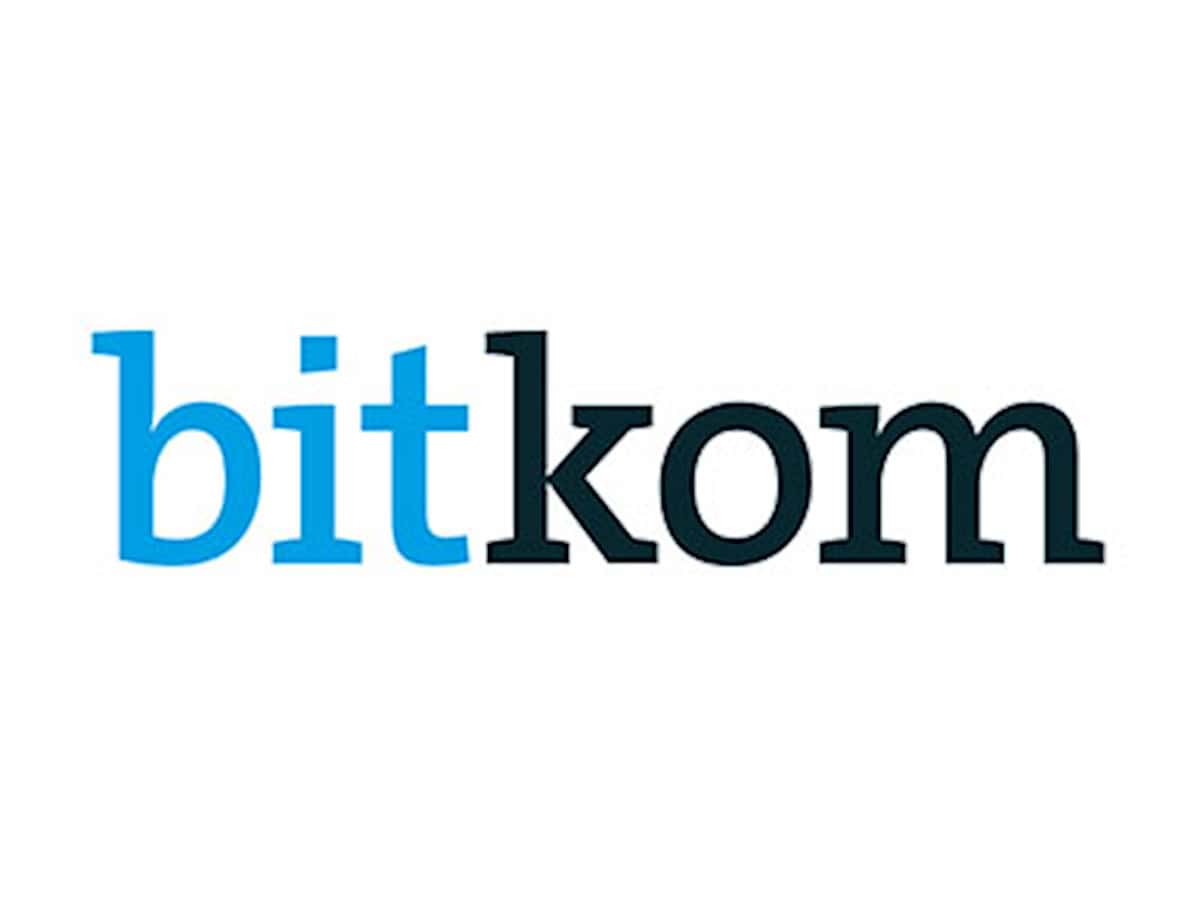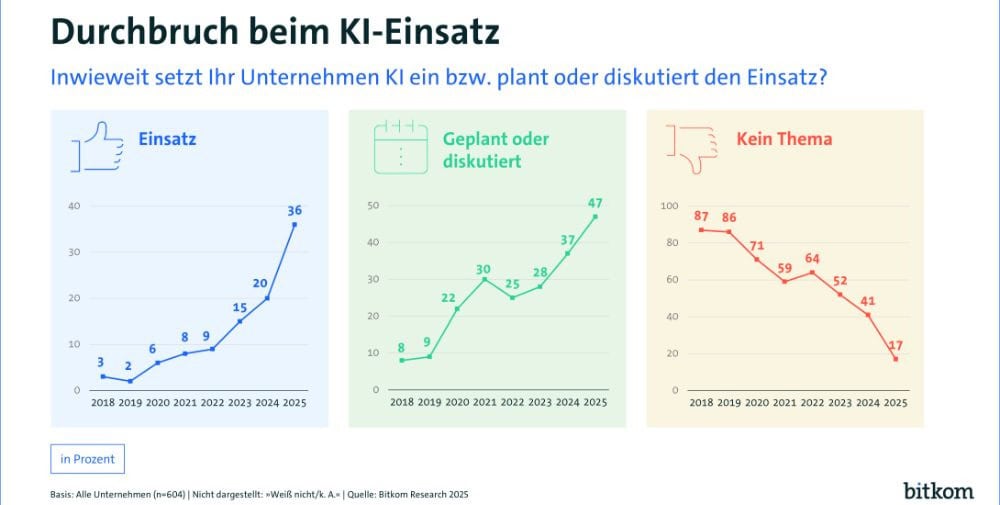
“Artificial intelligence has achieved a breakthrough in the German economy,” says Bitkom President Dr. Ralf Wintergerst. “Companies have not only recognized the possibilities of AI, they are using AI and investing in it. This is good news for the competitiveness and future viability of the German economy.”
Opportunity perspective on AI dominates
In the meantime, 8 out of 10 companies (81%) are certain that AI is the most important technology of the future (2024: 73%), while only 17% still consider it to be a hype that will pass (2024: 26%). For the first time, a narrow majority of 51% believe that companies that do not use AI have no future (2024: 48%). Conversely, only 31% believe that AI looks spectacular, but does not bring any concrete benefits to the company. A year ago, the proportion was significantly higher at 46%.
With regard to their own company, 83% see AI as an opportunity, compared to 78% a year ago and only 68% in 2023. Only 14% see AI as more of a risk, and just 1% believe that AI will have no impact on their own company. Around a quarter (24%) believe that AI will change their own business model. Almost as many (23%) are concerned that AI will jeopardize the existence of their company. “AI offers companies huge opportunities, regardless of size and industry. The biggest danger is to simply ignore AI and miss the AI train,” says Wintergerst.
29 percent of companies want to increase their AI investments
In the current year, 8 percent of companies that use, plan to use or are discussing the use of AI want to invest significantly more in AI than in 2024. A further 21 percent are planning to invest more. In contrast, only 5 percent plan to reduce their investments, and no company plans to significantly reduce them. 4 percent have never invested and have no such plans, meaning they are clearly only using free offers. The vast majority of 60 percent are keeping AI investments stable at the previous year’s level. “Getting started with AI is more affordable for companies than ever before. There are a large number of free offers to get an initial overview of the possibilities,” says Wintergerst. “However, particularly powerful and legally compliant AI that is specifically tailored to the needs of the respective company and deeply integrated into the company’s IT is not available for free.”
AI use: customer contact and communication dominate
Companies use AI predominantly in customer contact (88%) and in marketing and communication (57%). This is followed at a considerable distance by the use of AI in research and development (21%), within production processes (20%), in controlling and accounting (17%), in the HR department (14%) and in internal knowledge management (11%). AI is rarely used in management, in the legal or tax department and in sales (5 percent each) as well as in the IT department (2 percent). Around one in eight companies (12%) that use AI implement artificial intelligence in their own products and services. “Many companies are currently still using AI selectively. With the initial experience and expertise gained within the company, further fields of application can be developed. This is the only way to exploit the full potential of AI,” says Wintergerst.
The mostly sporadic use of AI is reflected in the number of AI applications used in companies. A quarter of companies (24 percent) that use AI only use one application, a further 27 percent use two applications and 24 percent use three applications. Just 6 percent use four applications, and only 2 percent use five or more applications. 17% are unable or unwilling to provide any information.
20% expect AI to result in fewer jobs, 7% expect more
It is currently difficult to estimate what impact AI will have on the job market. The vast majority (67%) of companies in Germany expect AI to have no impact on the number of employees. A fifth (20 percent) believe that the number of employees will fall as a result of AI – by an average of 7 percent. At the same time, 7% of companies expect the number of employees to increase as a result of AI, by an average of 8%. Among companies that already use AI, 28% expect the number of employees to fall by an average of 7%, while 9% expect an increase, by an average of 9%. 57% assume that AI will have no impact on the number of jobs. Around a third of all companies (31%) believe that AI will help to alleviate the shortage of skilled workers in Germany. “AI will change job profiles, some will even disappear. But other, new professions will emerge,” says Wintergerst. “For the German labour market, with its challenging demographic structure and an already high shortage of skilled workers, AI is a great opportunity: in the future, we will have more work than people who can do it, we need digitalization and new technologies in order to remain competitive in companies and efficient in administrations.”
Currently, just 5 percent of all companies are specifically hiring skilled workers with AI skills. Another 27 percent have planned to do so, 24 percent are discussing it, but for 43 percent it is not an issue. And only 8 percent offer AI training for all employees, a further 21 percent for the majority of employees and 25 percent for selected employees. But 43 percent have no corresponding offerings. “Companies have a responsibility to build up AI expertise themselves. Every company should therefore train its employees in AI. Companies that use AI are even obliged to do so under the AI Act,” says Wintergerst.
AI hurdles: Legal uncertainty, lack of expertise and no personnel
The biggest obstacles to the use of AI in the German economy are uncertainty due to legal hurdles and lack of clarity (53 percent), a lack of technical expertise (53 percent) and a lack of personnel resources (51 percent). 48% complain about the high data protection requirements, 39% are afraid that data will fall into the wrong hands, 38% cite the lack of traceability of results, 36% the poor quality of results, 36% also lack the money and 35% are concerned about future legal restrictions on the technology. For 31 percent, the lack of employee acceptance is one of the biggest obstacles, 24 percent lack data for AI use, 23 percent see no use cases and 17 percent have ethical concerns.
For 9 out of 10 companies, the country of origin of the AI provider is important
For a large majority of 88 percent of companies, the country of origin of the AI provider is important. Of these, 93 percent would prefer an AI from Germany, followed at a clear distance by the USA (51 percent), Japan (43 percent), EU countries other than Germany and France (40 percent), France (38 percent) and the UK (37 percent), South Korea (29 percent), Israel (27 percent), India (22 percent), Ukraine (19 percent) and China (18 percent). AI from Russia is not an option for any company. “Companies want AI providers from Germany. However, they will only be successful if they are just as efficient as the offerings from abroad and competitive in terms of price,” says Wintergerst. “We in Germany must not resign ourselves to a role as an AI user country, we must become an AI provider country.”
A majority see more disadvantages than advantages in the AI Act
However, companies are critical of the current AI regulation. 56% are of the opinion that the European AI Act creates more disadvantages than advantages for German companies. At the same time, 23 percent of companies expect to be affected by the AI Act as users and 1 percent as providers. 32 percent do not consider themselves to be affected by the AI Act, 30 percent are still reviewing this and 11 percent have not yet dealt with the AI Act.
Of the companies that expect to fall under the EU regulation, 93 percent assume that this will mean a high level of effort for them: 49 percent expect a very high level of effort, 44 percent a rather high level of effort. Around a third of the affected companies (37%) expect to operate a so-called high-risk AI system, while 29% expect to operate two. Only 4 percent expect to have three or more high-risk systems, while 2 percent do not have a high-risk system. But 29 percent are unable or unwilling to make a statement on this. “When it comes to the AI Act, we need clarity for companies quickly regarding the exact implementation. And companies need a contact person at federal level to support them in using AI in compliance with the AI Act,” says Wintergerst. It is essential that the implementation deadlines for the high-risk requirements are postponed by at least two years. Due to a lack of standards and the resulting legal uncertainty, there is otherwise a risk of “a complete brake on innovation in the high-risk AI sector”, says Wintergerst. In addition, the high-risk requirements in sectors that are already heavily regulated, such as medical devices and machines, should be made more flexible in order to avoid creating inconsistencies and redundancies with existing regulation.
What politicians should do for AI
The main things companies would like to see from politicians are support for German AI providers (51%), a reform of the AI Act (46%) and better access to data (45%). Around a third of companies would focus on promoting AI research (36%), investing in AI computing infrastructure (34%) and promoting the use of AI in administration and public authorities (31%). 28% are in favor of promoting the use of AI in business, 17% are in favor of promoting AI start-ups and 6% are in favor of promoting AI talent. Only 8 percent believe that the government should not focus on AI. More than one in three companies (37 percent) would even like to see regulation of AI waived for 10 years – an idea that has been discussed in the USA. “When it comes to promoting AI, we need a holistic strategy,” says Wintergerst. “This includes becoming much more ambitious in terms of both the breadth of the measures and the investment sums.”
Bitkom invites you to the AI & Quantum Summit in Berlin
The use of AI is also the focus of Bitkom’s AI & Quantum Summit on September 16 and 17 in Berli. More than 1,800 participants and more than 200 speakers from business, research and public authorities are expected to attend. The speakers include Dr. Daniela Brönstrup, Vice President of the Federal Network Agency, Ana Paula Assis, SVP and Chair IBM EMEA and Growth Markets at IBM, Dr. Antonio Krüger, CEO of the German Research Center for Artificial Intelligence (DFKI), Benjamin Revcolevschi, CEO of OVHcloud, Daniela Theisinger, Managing Director at Deutsche Telekom Global Business, and Kenza Ait Si Abbou, AI expert, author and former CTO at FIEGE. Speaking from the world of politics will be Dorothee Bär, Federal Minister for Research, Technology and Space, Roberto Viola, Director General of DG CONNECT, and Kilian Gross, Deputy Director of the AI Office.
– – – – –
Further links
👉 www.bitkom.org
👉 Program of the AIDAQ
Graphic: Bitkom




